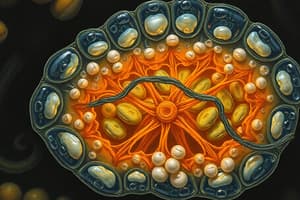Podcast
Questions and Answers
Which organism is commonly used to study transcription, translation, recombination, DNA repair, and gene regulation?
Which organism is commonly used to study transcription, translation, recombination, DNA repair, and gene regulation?
- Prokaryotes
- Baker's yeast
- Escherichia coli (correct)
- Caenorhabditis elegans
Which organism was the first eukaryote genome to be fully sequenced?
Which organism was the first eukaryote genome to be fully sequenced?
- Caenorhabditis elegans
- Escherichia coli
- Baker's yeast (correct)
- Prokaryotes
Which organism lacks distinct tissues and is thus limited in its use as a model organism?
Which organism lacks distinct tissues and is thus limited in its use as a model organism?
- Baker's yeast
- Prokaryotes
- Escherichia coli
- Caenorhabditis elegans (correct)
Which organism was chosen as a model organism for its simplicity and experimental tractability, with initial interest in the development of the nervous system?
Which organism was chosen as a model organism for its simplicity and experimental tractability, with initial interest in the development of the nervous system?
Which organism is commonly used to study basic eukaryotic phenomena?
Which organism is commonly used to study basic eukaryotic phenomena?
Flashcards
Model organism for transcription, translation, etc.
Model organism for transcription, translation, etc.
Escherichia coli is commonly used to study molecular processes like transcription, translation, recombination, DNA repair, and gene regulation.
First sequenced eukaryote genome?
First sequenced eukaryote genome?
Baker's yeast was the first fully sequenced eukaryote genome.
Limited model organism? (lack of tissues)
Limited model organism? (lack of tissues)
Caenorhabditis elegans lacks distinct tissues, limiting its use in studying complex biological phenomena.
Model organism for nervous system?
Model organism for nervous system?
Signup and view all the flashcards
Eukaryotic phenomena study?
Eukaryotic phenomena study?
Signup and view all the flashcards
Study Notes
Model Organisms
- Escherichia coli (E. coli) is commonly used to study transcription, translation, recombination, DNA repair, and gene regulation.
Genome Sequencing
- Saccharomyces cerevisiae (yeast) was the first eukaryote genome to be fully sequenced.
Limitations of Model Organisms
- Saccharomyces cerevisiae (yeast) lacks distinct tissues, limiting its use as a model organism.
Nervous System Development
- Caenorhabditis elegans was chosen as a model organism for its simplicity and experimental tractability, with initial interest in the development of the nervous system.
Eukaryotic Phenomena
- Saccharomyces cerevisiae (yeast) is commonly used to study basic eukaryotic phenomena.
Studying That Suits You
Use AI to generate personalized quizzes and flashcards to suit your learning preferences.




